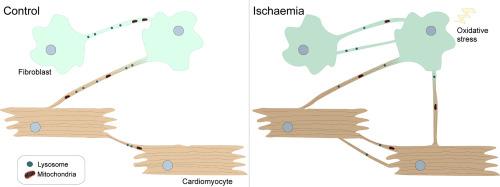Ischaemia impacts TNT-mediated communication between cardiac cells
Abstract
Efficient contraction of the heart relies on a highly regulated communication network between cardiac cells. Direct intercellular communication is mediated by gap junctions but can also occur through tubular structures named tunnelling nanotubes (TNTs), which connect the cytoplasm of neighbouring cells and facilitate the transport of various cargoes. Although the formation of TNTs between cardiomyocytes has been reported, the effect of ischaemia on this process remains unclear. In this work, we assessed the impact of ischaemia and oxidative stress on TNT-mediated communication between cardiac cells. We found that cardiac cell lines and neonatal primary cultures of cardiomyocytes subjected to in vitro ischaemia form more TNTs than control cells. Moreover, antioxidants prevented ischaemia-induced TNT formation, suggesting that oxidative stress regulates this process. Furthermore, we identified troponin T as a new specific marker of cardiomyocyte-derived TNTs, which allows for the identification of heterocellular TNT connections between cardiomyocytes and other resident cells in the heart, such as fibroblasts. We also determined the presence of TNT-like structures in rat and human hearts. Rat hearts subjected to global ischaemia in the ex vivo Langendorff system showed increased formation of TNTs. Altogether, this study demonstrates that ischaemia affects the formation of TNTs in the heart and sheds new light on the regulation of TNT-mediated communication between cardiomyocytes.


 求助内容:
求助内容: 应助结果提醒方式:
应助结果提醒方式:


